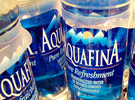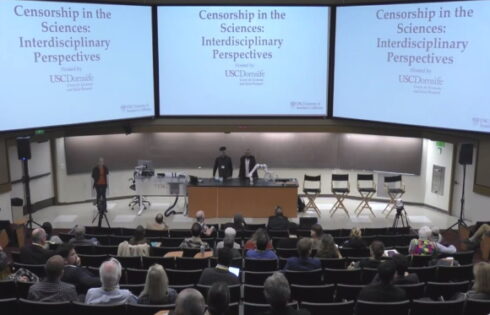
 In an effort to educate students about the great evils of bottled water, the University of Michigan has spent gobs of money on extravagant new drinking fountains that feature water bottle filling stations and – I’m not making this up – a cute digital counter to indicate how many plastic bottles responsible students have avoided using. Signs laden with water bottle-related facts accompany these fountains, constantly reinforcing the “bottles are bad” meme.
In an effort to educate students about the great evils of bottled water, the University of Michigan has spent gobs of money on extravagant new drinking fountains that feature water bottle filling stations and – I’m not making this up – a cute digital counter to indicate how many plastic bottles responsible students have avoided using. Signs laden with water bottle-related facts accompany these fountains, constantly reinforcing the “bottles are bad” meme.
Yet if you’re unwilling to use a refillable container and able to burn the cash, you can still buy bottled water at university vending machines and on-campus stores–for now. That will change if a Michigan Student Assembly initiative to ban the sale of water bottles on campus is successful.
I could make any number of snide comments about how this new initiative seems completely contrary to the aims of the campus-wide smoking ban (if you’re trying to promote a “culture of health,” why remove a healthy alternative to bottled sodas from vending machines?). It is, at the very least, student-driven, unlike the UM Administration’s anti-tobacco edicts. Instead, I’ll try to shed some light on the mentality works tireless to justify this breed of interventionism.
The guiding force behind the UM’s anti-water bottle actions thus far is a notion called “libertarian paternalism.” There’s a thorough explanation and takedown of the concept at Reason; to sum it up, libertarian paternalists seek to give individuals choices while making it easier to take the “right” path. They try to rig the game to lead to social outcomes they have deemed optimal.
So, instead of removing water from vending machines, the university simply adds flashy bottle filling stations and tries to guilt students into abandoning the convenience of disposable bottles. While tiresome, policies like these can be ignored (that’s the supposedly “libertarian” aspect), which is precisely why they never seem to satisfy the nannies. Often, individuals continue to choose the supposedly undesirable course of action because the advantages it offers are great enough to outweigh the hassles put in place by the paternalists.
When the soft touch approach fails, as it often does, the nudge becomes a shove backed by the full force of regulation and legislation. Thus, an effort to reduce water bottle usage rapidly leads to calls for a complete ban.
In the interest of full disclosure, I’ll add that I already use a reusable water container; a ban would have no direct effect on me. Still, it is a relatively mundane and inconsequential example of a destructive impulse that operates at all levels of power.
Never be fooled by calls for “voluntary” action or placated by assurances that you will be able to “opt out” of proposed regulations: the sentiment that motivates paternalists inevitably justifies a quick transition from mere suggestion to outright coercion.
Graham Kozak is a staff writer for the Michigan Review. He is a contributor to The College Fix.
Photo credit: Diego_3336 (Flickr Creative Commons)
Like The College Fix on Facebook / Follow us on Twitter





Please join the conversation about our stories on Facebook, Twitter, Instagram, Reddit, MeWe, Rumble, Gab, Minds and Gettr.